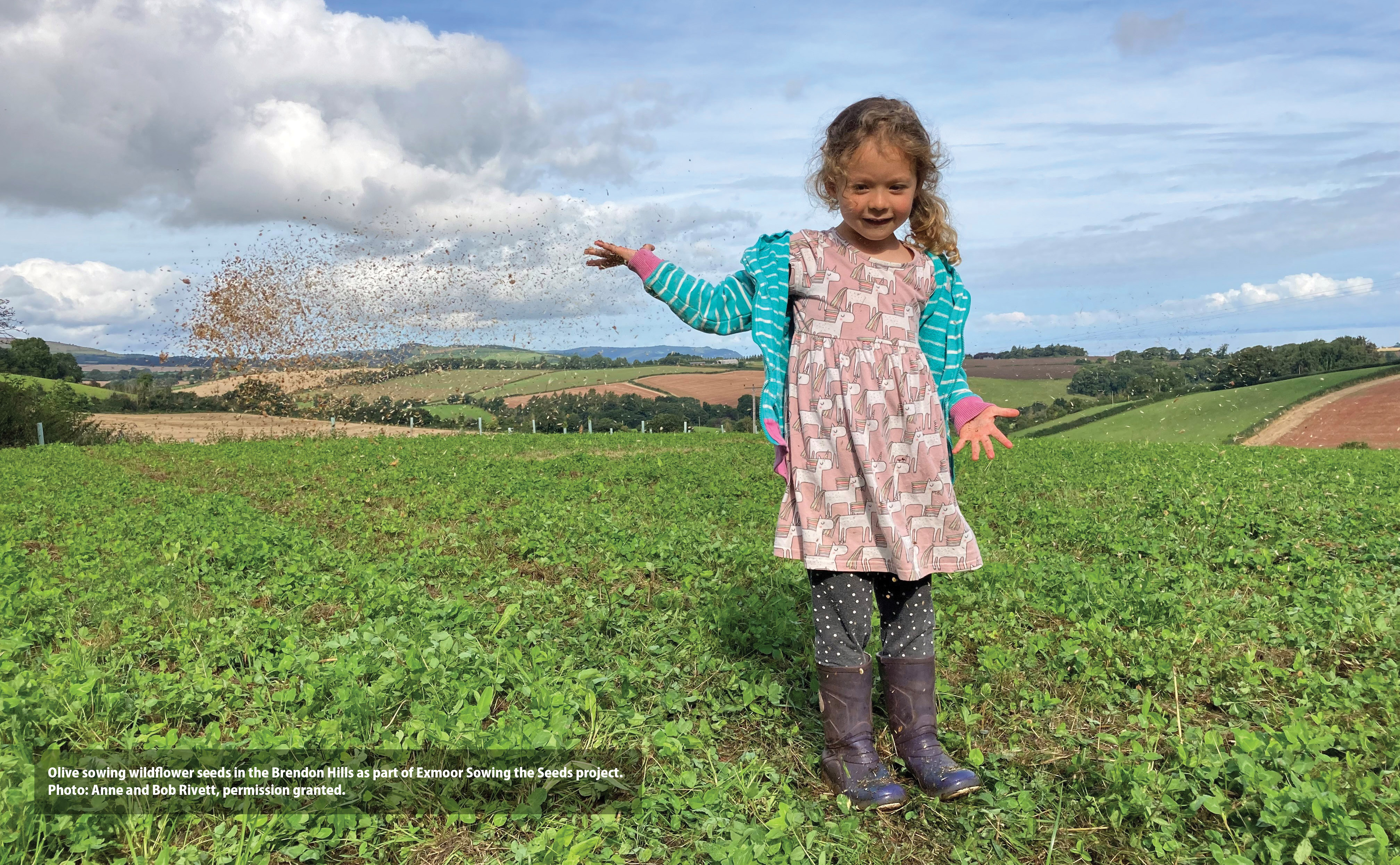Sowing the Seeds

Your donations will help us to restore, create and link species-rich grassland on Exmoor.
We are now working with 59 landowners, managers, and community groups to restore, rejuvenate, and create wildflower meadows across over 325 hectares of Exmoor. Our Sowing the Seeds project officer Lucy Cornwall has been busy undertaking soil and botanical surveys to monitor the success of seeds sown, as well as assessing how best to create more meadows. Donations to CareMoor have supported our purchase of a straw chopper and salt spreader and trailer, all essential for this work.
In 2024, we’ll be setting up a wildflower nursery to grow more plants and become a community growing hub. This will be an important resource for propagating meadow plant species such as devils-bit scabious, which benefits from nursery propagation.
Donations will continue to help us work with communities across Exmoor to create and restore species-rich grasslands and inspire an appreciation of our valuable meadow habitats. Every £10 donated will help us create and manage 10m2 of wildflower meadow.
If you’d like to make a donation to support this exciting and worthwhile project, then you can DONATE DIRECT TO THE APPPEAL ONLINE HERE.
Send a gift card
You can send a specially designed Greetings Card and Certificate of Donation to the Sowing the Seeds Appeal, by visiting one of our National Park Centres or using our online shop. See the links below for details and images of the cards.
If you’d like to discuss your donation with us, please email caremoor@exmoor-nationalpark.gov.uk
Meadows attract a multitude of wildlife and often support flora and fauna that cannot thrive in other habitats. Typically characterised by species such as black knapweed, ox-eye daisy, yellow rattle, hawkbits, vetches and rarer orchids, they can also support colourful waxcap fungi with names such as parrot, snowy and crimson. In addition to being aesthetically beautiful, they are ecologically important as they provide areas for pollinating insects, nesting, food gathering, shelter and even animal courtship displays. Flower-rich meadows can also be historically important, part of our local rich heritage and their enjoyment can contribute to our own wellbeing.
Like other ecosystems, meadows experience increased pressure due to climate change, especially as precipitation and weather conditions change. However, grasslands and meadows also have an important climate change mitigation potential as carbon sinks; deep-rooted grasses store a substantial amount of carbon in soil.
The loss of wildflower meadows, botanically richer than any other habitat, has been staggering; 97% have been lost since the 1930s. 75% of remaining meadows occur in small fragments and remain vulnerable to destruction. Over the last 30 years we have seen the drastic decline of meadows and species rich grassland on Exmoor which has also affected the populations of important species, such as pollinators, that are dependent on them. It is estimated that Exmoor has only 2500ha of flower-rich meadow remaining…….we want to change that.
The Exmoor Sowing the Seeds Project is a major collaboration between Exmoor National Park Authority, Devon Wildlife Trust, Farming and Wildlife Advisory Group South West, South West Water, and others. CareMoor donations continue to support this project.
In 2021 we harvested 30kgs of seed, which provided seed for 5 landowners to restore over 11 acres of meadow. We also funded the harvesting of 4 acres of green hay to restore nearly 4 acres of meadow on a neighbouring farm.
In 2022 we purchased a seed harvester that is now available for us to use and loan to landowners around Exmoor to help them create new meadows. One of our meadow owners grew 100 oxeye daisy plug plants which were distributed and planted in meadows. Using the seed harvester, we collected 110Kg of wildflower seed from 3.5 hectares of species-rich local meadow, and suppled these seeds to 14 sites, which restored 22 hectares of meadow.
During 2023, we carried out soil and botanical surveys to inform management, harvested 160 kg of wildflower seed locally, and provided seed, support, and guidance to 59 landowners, managers and community groups to restore and create wildflower meadows across over 325 hectares of Exmoor. Donations to CareMoor supported our purchase of a straw chopper and seed spreader, all essential for this work. We hand harvested knapweed and devil’s bit scabious seeds to grow as plug plants for meadow planting. We’re collaborating with the National Trust and Devon Wildlife Trust to refine techniques in meadow restoration, and we ran a series of plant identification and meadow management workshops for meadow owners. We also ran sessions with school groups at our Pinkery Centre for Outdoor Learning, and worked with pupils from a local primary school to create a new meadow area in their playground.
In 2024, we will continue to work with landowners, school groups, and organisations across Exmoor on meadow restoration, running events that engage people to connect with meadow landscapes, and hold workshops which support meadow owners to manage meadow habitats. We will also be setting up a wildflower nursery to grow more meadow plants and become a community growing hub.
Would you like to help, learn more or become a donor site?
We would love to hear from anyone interested in meadow creation, at any scale, and also from people with existing flower-rich meadows who might be interested in becoming a donor site. Please contact us at naturerecovery@exmoor-nationalpark.gov.uk.

